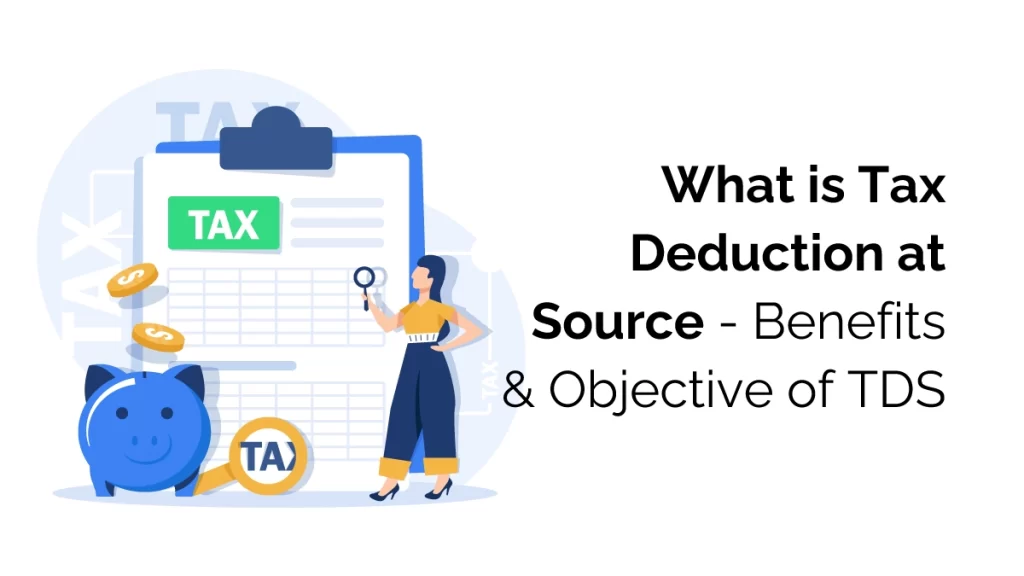Taxpayers often feel confused by the intricate regulations and procedures surrounding taxation in India. One key component is Tax Deduction at Source (TDS), an indirect form of collecting taxes at the source of income. TDS plays an integral part in India’s overall tax framework; therefore, understanding it entirely is crucial for both taxpayers and tax authorities alike.
Government revenue flows more steadily to them throughout the year instead of waiting until tax payments come due at year’s end. Businesses abide by TDS to avoid penalties and build credibility with regulatory authorities, while knowing its workings allows individuals to claim refunds more accurately while planning finances more effectively.
Let’s explore TDS’s meaning, objectives, and benefits in India. We will also delve into the technicalities of how TDS works and who is responsible for TDS deduction and payment. So, let’s get started.
What is Tax Deduction at Source (TDS)
TDS (Tax Deferral System) is an indirect method of taxation designed to increase government revenue by collecting taxes at the point of income creation as quickly as possible.
TDS applies to many income sources in India, such as salaries, interest on bank deposits, rent payments, commission payments and royalties. TDS forms part of India’s tax system and is governed by the Income Tax Act 1961.
Objectives of TDS
The primary objective of Tax Deduction at Source is to ensure a regular flow of revenue to the government by collecting taxes at the source of income. TDS also aims to:
- Stop Tax Evasion: TDS stops people from cheating on their taxes by making sure that taxes are collected as soon as feasible after income is made.
- Tax Collection Made Easier: TDS makes it easier for the government to collect taxes because the tax amount is taken out of the payment right away.
- Encourage transparency: TDS makes the tax system more open by showing a clear record of tax payments and revenues.
- Broaden the Tax Base: TDS helps to broaden the tax base by bringing more people into the tax base.
Benefits of TDS
Apart from the above objectives, TDS also provides various benefits to taxpayers, such as:
- Avoiding fines: Taxpayers can prevent fines for not paying their taxes on time or at all by making sure they follow TDS rules on time.
- Ease of Paying Taxes: TDS makes it easier for people to pay their taxes because the tax amount is taken out of the payment right away.
- Less Tax Liability: Taxpayers can use TDS as a credit against their tax liability, which lowers the amount of tax they have to pay overall.
- Better Compliance: TDS encourages taxpayers to pay their taxes on time because they have to deduct and send them to the government on time.
These points clearly highlight what is Tax Deduction at Source and why it is such an important part of India’s taxation system.
How TDS Works
As part of making payments to recipients, payers deduct TDS (Tax Deducted at Source). This tax amount is then sent back to the government by way of deduction, and they issue a TDS certificate as evidence.
Example: if a company pays an employee a salary of Rs. 50,000 per month, TDS will be withheld according to current TDS rates and paid directly into government accounts. Once the TDS amount has been deducted from the payout amount and submitted to the government channels for payment by the company, the employee receives pay after deduction of the TDS amount plus company will issue a TDS certificate as proof.
Who is Responsible for TDS Deduction and Payment?
Under TDS, deductors have the responsibility of collecting and remitting taxes to the government. A deductor may include individuals or any entity making payments directly to payees who must deduct TDS accordingly – this could include individuals making payments directly, companies with partnership firms, government agencies or any other organisation making payments directly.
Before paying payments to payees, deductors are obligated to deduct the Tax Deduction and Collection Account Number (TAN), which should then be quoted throughout all TDS-related documents. Once deducted, deductors are expected to remit it back to the government by its due date specified. These steps form the core process of what is Tax Deduction at Source, ensuring that taxes are collected systematically and credited to the government on time.
TDS Rates and Threshold Limits
The government has set TDS rates and threshold limits for different types of payments. The TDS rates and thresholds are subject to change from time to time. The rates and limits are determined based on the nature of the payment, the recipient of the payment, and other factors.
For example, for salaries, the rate of TDS (Tax Deducted at Source) depends on the income tax slab rate that is relevant to the employee. For rent payments, the TDS rate is 10% if the annual rent exceeds Rs. 2,40,000. For payments to contractors, the TDS rate is 1% for individuals and HUFs, and 2% for other entities if the payment exceeds Rs. 30,000 in a single transaction.
TDS Returns
Filing TDS returns is mandatory for those who deduct TDS. TDS returns are filed quarterly, and the due dates for filing the returns are July 31, October 31, January 31, and May 31. TDS returns must be filed using the government’s online portal, and the details of the TDS deducted must be entered accurately.
Failure to file TDS returns on time can lead to penalties and interest. The government may also take legal action against the deductor for non-compliance.
Provisions on Which the Tax Deducted at Source or TDS is Applicable
TDS is applicable to various provisions under the Income Tax Act. Here are some of the provisions on which TDS is applicable:
1. Salaries: TDS applies to salaries paid to employees by their employers. Employers must deduct TDS on salaries if the salary amount exceeds the basic exemption limit.
2. Interest: TDS is applicable on interest earned on savings accounts, recurring deposits, and fixed deposits, if the interest amount surpasses the specified threshold limit.
3. Rent: TDS is applicable on rent paid to landlords if the annual rent paid exceeds a certain limit.
4. Commission and brokerage: TDS is applicable to commission and brokerage payments made to agents, brokers, and other professionals.
5. Professional fees: TDS is applicable to professional fees paid to lawyers, doctors, architects, and other professionals.
6. Lottery and gambling: TDS is applicable to winnings from lotteries and gambling if the winnings exceed a certain limit.
7. Sale of property: TDS is applicable on the sale of immovable property if the sale price exceeds a specified limit.
It is essential to note that the TDS rates, threshold limits, and compliance requirements may vary depending on the specific provisions. Therefore, it is necessary to understand the provisions and their respective TDS applicability to ensure compliance with the law. TDS has a significant role in the Indian economy. By familiarizing yourself with concepts such as TDS and Income Tax, you have a greater advantage in various industries. Upskilling is significant in securing a career in the accounting sector. If you intend to upgrade your knowledge of the Income-tax system and related concepts, Finprov, the ed-tech institute, is there for you.
At Finprov, you can earn expertise in handling the Income tax system, which comprises sessions such as TDS, TDS certificate, TDS on salaries, TDS on other payments, etc. The Tally Prime course offered by the institute helps you to handle the TDS on the basis of practical-oriented training based on a real case study. Our team provides the best training on various accounting and finance courses such as PGDIFA, PGBAT, CBAT, SAP FICO, MS Excel, etc.
FAQs
Q1. What happens if the TDS deducted is less than what is required?
If the TDS deducted by the deductor is less than required, the deductor will be liable to pay interest on the shortfall amount.
Q2. Can a payee claim a refund of TDS?
Yes, a payee can claim a refund of the TDS deducted if the payee’s total income is lower than the taxable limit or if the TDS deducted is more than the tangible tax liability.
Q3. Can a deductor revise TDS returns?
Yes, a deductor can revise TDS returns if there is an error in the original return filed.
Q4. Is TDS applicable to foreign payments?
Yes, TDS applies to payments made to foreign entities as well. However, the rates and rules may vary for such payments.
Q5. When should TDS certificates be issued to the payee?
TDS certificates must be issued within the prescribed timeframe so that the payee can use them while filing income tax returns and claiming credit for the deducted amount.










